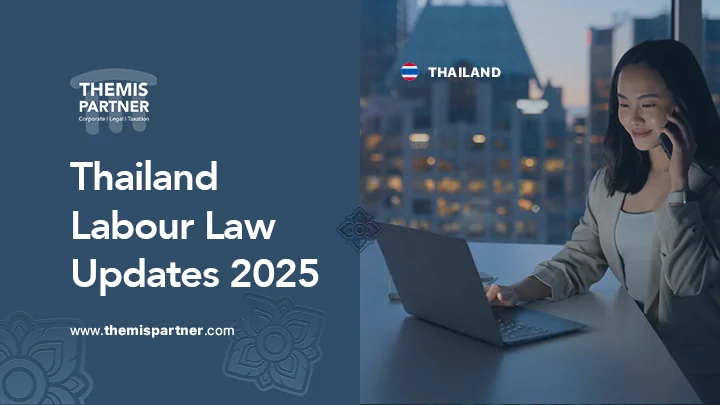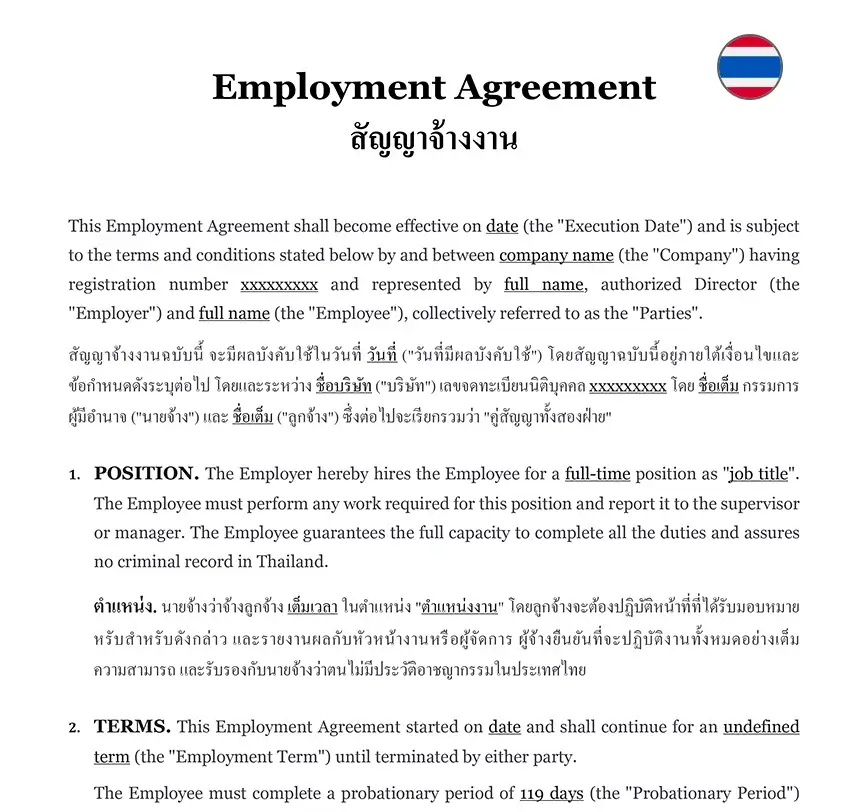In 2025, Thailand Labour Law introduces regional minimum wages now topping THB 400 per day and guarantees expanded rights for maternity leave, digital contracts, and gig workers.
Businesses of all sizes must navigate a fast-evolving legal landscape: electronic agreements, strict payroll records, and real-time audits are now standard expectations.

Understanding these updated requirements can help you avoid costly missteps, protect your workforce, and build lasting trust with employees and regulators alike.
Key Takeaways
-
New Labour Protection Act sets daily wages (THB 337-400), 98-day maternity leave, and recognizes digital contracts.
-
E-contracts and digital payrolls are valid if Thai-language and PDPA-compliant.
-
Probation capped at 119 days; all employees need written notice before termination.
-
Workers receive equal core benefits: 6 annual leave days, 30 sick days, 13 holidays.
-
Strict digital audits and penalties make regular compliance reviews vital.
-
Work rules must be posted or shared digitally within 15 days of updates.
-
Termination requires 1-month notice and 30-400 days’ severance by service.
-
Foreign hires need valid permits; LTR visas allow up to 10-year stay.
Looking to outsource HR & payroll?
Our team handle payroll, HR administration, PEO employment, and full visa and relocation support.
Table of Contents
-
Key Frameworks of Thailand Labour Law in 2025
-
What Rules Must Employers and Employees Follow?
-
What Are the Minimum Wage, Salary and Employee Benefits?
-
Working Hours, Overtime Pay and Leave Entitlements Explained
-
Termination, Severance and Foreign Worker Compliance
-
FAQ: Thai Labour Law 2025
-
Conclusion
Key Frameworks of Thailand Labour Law in 2025
How Has the Labour Protection Act Evolved?
The Labour Protection Act (LPA) forms the backbone of Thailand Labour Law, setting standards for worker protections, contracts, and employment conditions.
Recent 2025 amendments include:
- Minimum wage increases (now THB 337-400 per day by region)
- Expanded leave rights (98 days maternity leave with 45 paid days)
- Digital contract recognition and strengthened compliance tools
Compared to past cycles, the 2025 LPA aligns more closely with International Labour Organization (ILO) standards and strengthens equal protections for permanent, temporary, and gig workers. Access full legislation and updates at Ministry of Labour.
Thailand Labour Law now guarantees clearer, more modern protection for all workers—no matter the industry or contract type.
Which Authorities Enforce Thai Labor Regulations and Compliance?
The Department of Labor Protection and Welfare leads enforcement, backed by regional labor offices and mandated workplace inspections.
Key protocols include:
- Routine and unannounced audits, with digital report filing
- New employer reporting requirements for electronic contracts and payroll
- Strict penalties for non-compliance, including fines and possible lawsuits
Employers and professionals who proactively review the LPA and comply with reporting tools set a new standard for workplace transparency and legal safety.
By keeping these frameworks top of mind, organizations can safeguard both employee rights and business interests.
What Rules Must Employers and Employees Follow?
Are Written Employment Contracts Legally Required?
Written Employment Contracts are strongly recommended under Thailand Labour Law, with Thai contracts taking precedence in disputes.
Both fixed-term and open-ended contracts are common, serving distinct needs:
- Fixed-term contracts: Used for specific projects or time-limited roles.
- Open-ended contracts: Default for ongoing employment.
Mandatory clauses include:
- Job description and responsibilities.
- Remuneration, work hours, benefits, and leave policy.
- Termination procedures and notice requirements.
Contracts must be in Thai to be enforceable, even when bilingual.
PDPA-compliant digital agreements are recognized in 2025, if employers store and secure data:
- Electronic records must protect employee privacy.
- Digital filing satisfies Ministry of Labour standards.
What Should You Know about Probationary Periods?
Probation is usually capped at 119 days to avoid mandatory severance.
Key protections during probation include:
- Written or electronic notice before termination.
- Immediate payment of wages and accrued benefits on final day.
- Equal application of core Labour Protection Act rights.
Employers must avoid actions that could trigger premature severance claims. Probation protects both sides but never waives basic labour rights.
Download the Probation Period Termination Letter to end a probationary contract lawfully under Thai labour law.
What Are the Minimum Wage, Salary and Employee Benefits?
Minimum Wage Rates and Salary Vary by Region
Thailand labour law requires every employer to comply with the 2025 minimum wage, which ranges from THB 337 to 400 per day depending on location.
Major regional rates include:
- Bangkok, Phuket, Chon Buri, Ko Samui: THB 400 daily
- Most other provinces: THB 337- 370 daily
Employers must:
- Calculate wages according to role, region, and current legal rates
- Document overtime, paid at 1.5-3x the basic wage, based on day and hours worked
- Use digital payroll and retain records for all payments made
Typical payment cycles are monthly, with salaries to be paid no later than the last working day. Keeping digital records is now recommended for full compliance and easy audit.
Mandatory Employee Benefits and Welfare Fund Contributions?
By law, all employees are entitled to at least:
- 6 days paid annual leave
- Up to 30 days paid sick leave
- 13 paid public holidays
- 98 days maternity leave (45 days paid), with parental leave extensions under review
The Employee Welfare Fund is mandatory for most employers. Contributions support benefits in the case of termination, disability, or death.
Part-time, temporary, and many gig workers also receive leave rights and certain benefits, reflecting equal workplace protections.
For detailed wage updates, visit our article: Thailand Minimum Wage Rates 2025
Thailand’s 2025 workplace regulations put fair pay and reliable benefits front and center, making it critical for employers to check local rates and update payroll practices each year. These standards help create secure, compliant workplaces across all sectors.
Working Hours, Overtime Pay and Leave Entitlements Explained
Thailand Labour Law sets clear limits: 8 hours per day, 48 hours per week, with schedules tailored by sector.
Any overtime requires employee consent, unless an emergency arises. Overtime pay rates are legally set at least 1.5 times the regular wage, increasing for work on holidays or weekends.
Employers must provide the following annual paid leave entitlements:
- At least 6 days of paid annual leave
- Up to 30 days of paid sick leave
- At least 13 paid public holidays
- 98 days of maternity leave, with 45 days paid (pending reform for expanded parental leave)
Prompt payroll documentation and detailed overtime records are essential for workplace compliance.
For detailed figures on current wage and leave rights, visit the ILO Thailand Minimum Wage and Leave Updates.
Thailand’s statutory work hours and leave guarantees support predictable scheduling and fair pay.
How Do Remote Work and Digital Nomads Fit Thai Workplace Regulations?
Thailand Labour Law applies to remote, hybrid, and flex workers, whether based locally or abroad.
Employers are responsible for:
- Tracking remote work hours accurately
- Ensuring employment records comply with PDPA
- Making work rules accessible online or via internal platforms
Digital nomads and foreign employers face unique legal challenges, from work permit requirements to documentation of digital work agreements. Clear digital protocols and transparent time tracking are essential for legal compliance in Thailand’s evolving work landscape.
Download the Remote Working Contract to set clear terms for remote work under Thai employment law.
Termination, Severance, and Foreign Worker Compliance
What Procedures and Severance Are Required When Terminating?
Thailand Labour Law requires written notice for most employment terminations, typically one month in advance, unless the employee is dismissed for serious misconduct.
Lawful grounds for termination include contract completion, redundancy, or poor performance, but employers must follow correct processes to avoid wrongful dismissal claims.
Severance pay in 2025 is based on the employee’s length of service:
- 120 days to <1 year: 30 days’ wage
- 1 year to <3 years: 90 days’ wage
- 3 years to <6 years: 180 days’ wage
- 6 years to <10 years: 240 days’ wage
- 10 years or more: up to 400 days’ wage
Termination decisions must be documented, and disputes may be filed with the Labor Court if a claim arises.
Written notice and tiered severance pay protect both employers and employees under Thai labor law.
Download the Employment Termination Letter to end employment legally under Thai labour law.
What Are the Latest Rules for Employing Foreign Workers in Thailand?
Employers must secure valid work permits and appropriate visas for all foreign workers, with a standard quota of 4 Thai nationals per 1 foreigner.
Key compliance points in 2025:
- New Long-Term Resident (LTR) visas allow eligible professionals up to 10 years’ residency.
- All documentation, including digital copies, must be kept for inspection.
- Illegal employment can result in substantial fines and loss of business licenses.
Employers should routinely review Ministry of Labour and Department of Employment guidelines for updated rules.
FAQ: Thai Labour Law 2025
Can Thai labour law be enforced on employees working remotely outside Thailand?
Jurisdiction typically depends on where the work is performed and where the employment contract is governed.
For remote staff abroad, Thai labor law may still apply if the employment contract references Thailand or the work benefits a Thai entity.
Key exposure points include:
- Income tax obligations in both host and home countries
- Social security coverage and bilateral agreements
- Risks of regulatory disputes or dual jurisdiction claims
How do employers announce and display company work rules after 2025 changes?
From January 2025, firms must ensure work rules are both accessible and clearly communicated to all staff within 15 days of issuance or any update.
Accepted practices include:
- Digital posting on the company intranet or secure app
- Physical display at the workplace in a prominent area
Documentation must be available for at least one working year and in a form employees can easily access.
What protections apply to gig, temporary, and part-time workers under the new law?
The 2025 reforms extend core rights to all worker types, ensuring:
- Equal access to paid leave, minimum wage, and social welfare
- Rights to transparent employment contracts, regardless of worker status
For example, a part-time food delivery courier is now entitled to sick leave and must receive a written contract outlining all benefits.
Is security deposit collection still allowed for any employee category?
Security deposits are generally prohibited.
Exceptions exist for roles involving significant financial or asset risk, and employers need written ministerial approval to collect any deposit.
Employers should carefully document the purpose and handling of any permitted deposit to minimize compliance risk.
These updates mean that whether hiring in an office or managing a distributed workforce, employers in Thailand need to stay alert on announcing work rules, offering equal benefits, and keeping contract practices aligned with the latest Thai labor law reforms.
Conclusion
Now is the time to review employment contracts, update payroll systems, digitize compliance records, and confirm all workplace rules are accessible to every staff member—steps that safeguard your company and foster a thriving workplace.
If you need practical support or personalized advice, contact us today. Themis Partner offers clear guidance, ready-to-use HR document templates, and hands-on compliance solutions to help you meet every labour requirement with confidence and efficiency.


